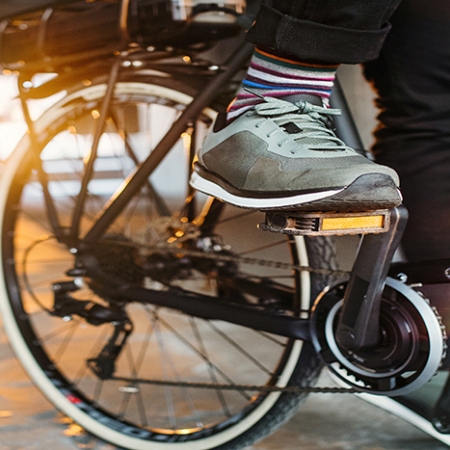The Christie NHS Foundation Trust was a shortlisted finalist in the Travel category of the 2020 NHS Sustainability Awards, sponsored by HEFMA.
The Christie NHS Foundation Trust aims to be a leading NHS organisation in tackling air pollution, working to reduce its effect on road traffic-related pollution and its carbon footprint. The ultimate intention is for the Trust to have a significant positive impact on the local environment, the local community and within Greater Manchester.
The Trust has a detailed Green Travel Plan with the ambitious target of 60% of staff using sustainable travel by 2030. An increase in staff travelling sustainably will reduce carbon footprint and traffic coming into Manchester. As part of the development of the Green Travel Plan (2014-2030) it was identified that circa 50% of staff live within five miles of the Trust. This highlighted the fact that active travel had a potential to contribute to the initial push towards the 60% modal shift target.
Behavioural change through overcoming barriers
Back in 2014 the Trust formed a Bicycle User Group to engage with staff who cycled to work and those considering switching to cycling. The initial purpose of the group was to identify any barriers to cycling. In addition to the meetings, engagement was facilitated through the annual staff travel survey that goes out to the entire workforce. The feedback was negative with a general feeling that there was limited support for cycling and a lack of engagement. Barriers to cycling included limited infrastructure such as secure bicycle parking and poorly maintained changing facilities, safety and lack of training.
A subsequent internal audit of facilities, conducted in partnership with Transport for Greater Manchester, identified the Trust had only 40 secure bicycle parking spaces, 147 short stay spaces - some of which were poor quality - only six showers/changing facilities and no lockers.
The Trust instigated an overhaul of this provision and engagement of staff with cycling. An initial budget of £245k was released for facilities and a further £100k followed in 2017 to fund sustainable travel. A comprehensive cycling package has been developed, which includes 176 secure bicycle spaces, 149 short stay spaces, 23 showers, proper changing facilities (with hair dryers, mirrors and seating), 247 lockers, drying areas, three bicycle maintenance points, free training and monthly maintenance and a free monthly cyclist's breakfast. There is also a bicycle user group mailing list, partnership with a local supplier, free internal pool bicycle scheme, staff engagement events, bicycle roadshows and Dr Bike winter safety checks.
Incentives are in place to encourage staff to cycle to work by supporting them in obtaining a new bicycle through a salary sacrifice scheme that allows them to save 25-39% tax.
Efforts were also aimed at raising staff engagement and participation with walking activities. Historically, ad-hoc seasonal walks held by the Trust were not well attended due to their infrequency. In August 2017 the Trust participated in the 12-week ‘Walking for Health’ programme, comprising short walks which included walk leader training.
In October 2017 ‘Walking Wednesday’ was launched to provide weekly 30-minute walks led by five Ramblers-accredited walk leaders. The marketing is informal to focus on it being a social event. ‘Walking Wednesday’ often attracts around 20 staff.
The Trust Sustainability Manager sits on the Greater Manchester (GM) Walking Voice Steering Group. The group has been set up in response to several key strategies and plans which all aim to increase walking in Greater Manchester. This includes Made to Move (2017) and GM Moving (2017-21). The Trust recognises that these strategies are opportunities for significant promotion of walking to improve health and wellbeing, reduce traffic congestion, make the environment more attractive and conducive to walking, make journeys safer and easier and improve air quality.
Bike to work scheme
Cyclescheme is the Trust's approved partner for this scheme, which helps employees to buy a bicycle. In line with new guidance, the financial cap for this scheme has been increased from £1,000 to £6,000, which will enable more staff to take up the opportunity to use a bicycle to commute by allowing access to products which had often been precluded due to their price tags.
Products that are now available to staff include:
• Electric Pedal Assisted Bicycles. The Trust recognises the electric pedal assisted cycle market has a fundamental role in supporting targets set for sustainable transport. Electric pedal assisted bicycles provide the health benefits of cycling and make it a viable option to those who require assistance on hillier terrain or whose levels of fitness previously made commuting to the Trust by bicycle out of reach. This also supports staff to commute longer distances.
• Cargo Bicycles. Cargo bicycles are specially designed to carry children and therefore can assist parents in undertaking the school run via sustainable travel. Childcare responsibilities are a common reason given for why sustainable travel is perceived as not an option for commuting by respective guardians.
• Inclusive Bicycles. These bicycles for people with disabilities are often made in lower volumes and may require specialists to engineer them, which can make them more expensive than other shop brought bicycles.
To meet its target for 60% of staff using sustainable transport by 2030, the Trust is developing proposals to provide additional secure bicycle compounds and changing facilities to support staff.
Outcomes so far
The investment and commitment to cycling and walking resulted in the Christie being recognised by Transport for Greater Manchester as the organisation in the area demonstrating the strongest commitment to active travel. This has been reflected internally with positive feedback from staff on the Trust’s full range of active travel infrastructure and incentives.
Now, 21% of the Trust's staff members commute via active travel (14% walk, 7% cycle) and benefit from a more active lifestyle. They - and the local neighbourhood - benefit from reduced congestion and improved air quality. There are financial benefits to the Trust as well, including reducing demand for car parking spaces and reduced sick days as staff living more active lifestyles may see an improvement in their health.
Furthermore, the Trust's Sustainability Manager is an active member of Transport for Greater Manchester’s Sustainable Journeys Team network, NPAG - NHS Car Parking & Travel Planning and NPAG – Sustainable Leadership network. As part of these networks the Sustainability Manager works with experts in the field of sustainable transport to:
• Provide subject matter expertise, best practice and advice
• Provide a channel for information exchange between member organisations, a wider network and internally
• Attend and actively participate in steering groups and workshops
• Identify opportunities to contribute, add value and influence in a positive way, initiatives to support sustainable travel at the Trust and as a result, in Greater Manchester as a whole.
The Trust is now using the new NHS Sustainable Development Assessment Tool as the latest driver to progress sustainability. The sustainability committee is turning the tool kit detailed requirements into individual actions to allow for target setting, identification of responsibilities, communication and monitoring. With regard to active travel the Trust will embark on supporting a further shift towards walking and cycling.
The Trust is ideally situated in Manchester, which enjoys the support of a Mayor who has put in place the first Walking and Cycling Commissioner. Going forwards, Bee Networks will support the Trust in developing an even stronger walking and cycling culture; with the benefits of a new network of cycling and walking routes, which ultimately could cross the Trust North, East, South and West and join up with existing routes.










